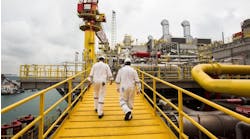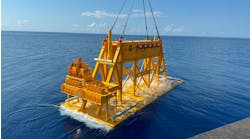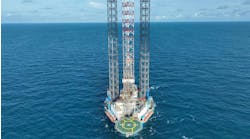Leonard Le Blanc
Tough discipline
Welcome to the world of open market commodity pricing! When (never if) over-production kicks in, prices drop ? and keep dropping. No mystery there. How do we stop over-producing? All producers around the globe have to shrink their own output by the percentage of production overhang, regardless of financial or operational difficulties. Tough order? You bet!Every producer is reluctant to trim by more than a token amount, citing contracts or internal and external cash flow problems. Nothing new here. Everyone has probably done supply and demand math, but for order?s sake, let?s repeat it.
Suppose a producer is producing 100,000 b/d and selling that oil volume into an average market price of $14/bbl. That?s $1.4 million each day. If the price drops to $11/bbl as a result of an 8% production over-supply, then income drops to $1.1 million/day.
But, what if, instead, a producer joined a hypothetical global output reduction combine and reduces production by 8%, to match the over-supply. The reduction could be less, with the same result, but let?s equal the overhang for simplicity?s sake. Prices would at least stabilize at $14/bbl. That means the producer?s output is now 92,000 b/d. At $14/bbl, that income drops to $1,288,000/day, less than the original $1.4 million/day, but much greater than the $1.1 million/day resulting from the $11/bbl oil price figure.
Such market controlling production agreements among OPEC and non-OPEC producers will probably be possible only when oil prices drop into the single digit levels. Without across-the-board pain, however, what often happens is that producers enter an output-price death spiral. Individual producers want to protect that $1.4 million/day income at all costs, so production is ramped up accordingly.
Is there an end? No, because the problem gets even hairier. Everything that can be used for oil storage is filled up ? onshore and at sea. Buyers keep bidding down future barrels and storing them and producers keep ramping up production to make up earnings. Soon, this super-surplus cannot be drained quickly.
In fact, right now, the industry has so much oil in storage that production corrections have virtually no effect on the market. Confused and isolated, most producers then give up, believing that nothing they do will have an effect.
What a shame. Oil market control should be 80% math and 20% politics, but the producer discussions we see now are just the opposite. There remain too many producers with too many agendas, and there are no penalties for over-production and no legitimate way to lever any.
Will the global oil industry ever gain control of markets so that there is at least price stability? Probably not. But this much can be said ? if the industry does it successfully, just one time, such organizational efforts will then be very capable of repeat performances.
Mideast nexus
The Middle East is missing out on a good opportunity. Equity markets, burned by Russia and Asia/Pacific investments, are in search of new emerging fields. At the same time, new reserves of oil and gas are under development in Egypt and in the Caspian Sea. All of this cash and oil is looking for a market. Why not fund and energize an industrial corridor on the shores of the eastern Mediterranean - from Turkey to Cairo.True, there are a lot of political problems to work out, but if leaders in the area had the opportunity to put both professionals and unskilled people to work instead of leaving them under-employed and filled with anger, there would be an opportunity to build a prosperous and stable middle class in the region. Large groups of skilled Lebanese, Israelis, Palestinians, and Egyptians are having to go abroad in search of jobs.
To bring about such industrialization, outside investors have to be relieved of war and seizure risks. Obviously, security agreements are necessary, and threats from regional dictators and terrorists on all sides must be neutralized.
The attractions are many. An industrial-commercial corridor can help build consumer markets in the Middle East, bringing oil income and investment back into the region, and especially to countries that lack oil reserves. Such an industrial corridor might be just the incentive needed to settle out longstanding hostilities.
Editor's Note: Business and technology markets evolve and expand, and publications that accompany them must keep up. Beginning with the next two issues, Offshore will expand by two new columns. Management & Economics will keep upstream management and supervisors aware of the latest thinking in planning and economics issues. Drilling and production issues will be divided into Drilling & Production Engineering and Field Development Technology, to provide the latest in system and component information and data. Two new staff members have joined Offshore to enhance coverage.
Copyright 1999 Oil & Gas Journal. All Rights Reserved.


